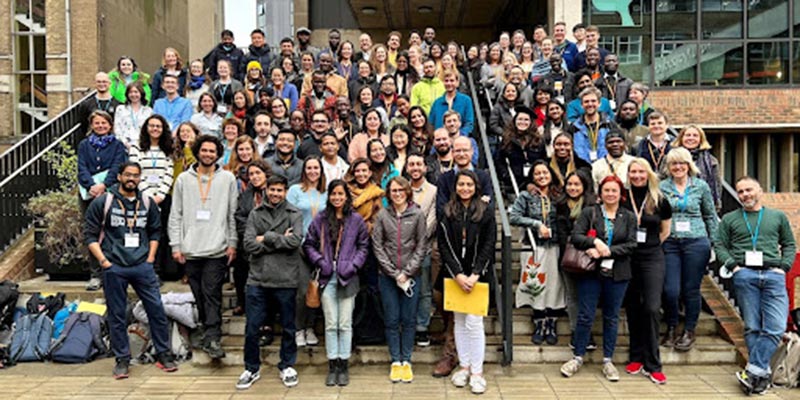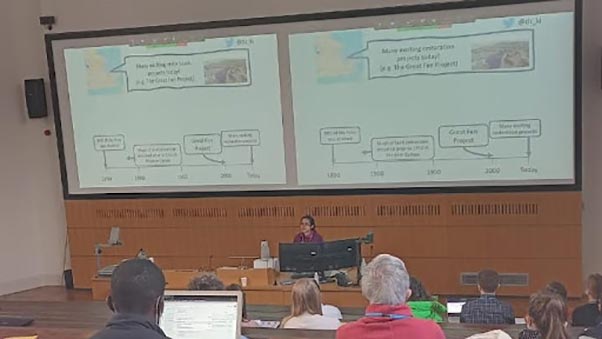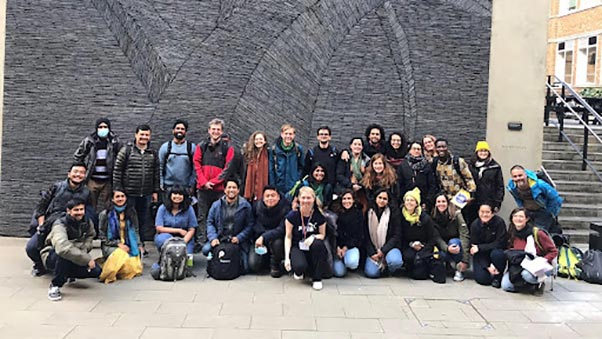Student Conference for Conservation Science 2022
Posted on Tuesday 5 April 2022

Last week, I had the amazing opportunity to meet outstanding conservation scientists from all across the world at the SCCS 2022 in Cambridge. My first in-person meeting since the pandemic began, it was truly extraordinary how the organisers managed to bring us all together, both the in-person attendees as well as virtual delegates calling in from many time zones. A momentous feat - huge thank you’s to the conference organisers (especially Nicky, Andrew, Ed and Rosie), the volunteers, and everyone who attended for an inspiring and memorable three days!
With 30+ talks and 100+ posters, four plenary speakers, countless workshops and interactive sessions involving delegates both online and in-person, it would be impossible to encapsulate all the amazing work presented and discussed at the conference. We heard inspiring success stories of both species conservation and the development of effective alternative livelihoods for local people. We were also introduced to novel techniques and approaches to long-standing conservation issues. Additionally, we had sobering discussions on topics ranging from the social impacts of conservation technologies we employ, to our conceptions of what constitutes an expert. We recognised the importance of remaining hopeful and optimistic in this crisis-driven discipline.
Despite being action-packed to the core, the conference also left plenty of space and time to get to know each other. It was fantastic to hear the stories about how everyone got to the amazing projects they have been working on, and what’s next in their journey!
I also had the fantastic opportunity of sharing some results from my undergraduate work with the Cambridge Museum of Zoology - a project which sparked my fascination with understanding long-term biodiversity change and informing conservation action using museum specimens.

Image credit: Adejo Rose Wisdom
The Fens was a large expanse of wetland habitat that spanned the majority of the east of England, but virtually all this wetland habitat was drained by 1850. As there weren’t long-term monitoring surveys back then and we don’t have a good understanding of what happened to most animal groups, current day restoration projects don’t really have good benchmarks to measure their success against. Capitalising on the abundance of local specimen material at the Cambridge Museum of Zoology, we wanted to understand how the species richness and community composition of aquatic insects changed with the large-scale drainage of the Fens. We transcribed all the specimen labels of the mayflies (Ephemeroptera), stoneflies (Plecoptera), caddisflies (Trichoptera), dragonflies and damselflies (Odonata) and diving beetles (Dytiscidae), then georeferenced them where locality information was available.
Despite museum specimens being collected haphazardly and patchily (and based on the interests and activities of the respective collectors), we found really striking patterns of change in both the number and identity of species between the two time periods. This indicates that a significant restructuring of the aquatic insect community occurred alongside the widespread drainage. The changes that we observed were remarkably close to what we predicted from the environmental changes that have taken place. Our results help to set a benchmark for long-term change in Cambridgeshire and inform ongoing large-scale restoration projects in the region, while also demonstrating the immense value of museum collections – even local collections like the Cambridge Museum of Zoology – for understanding long-term biodiversity change and informing conservation action.

Image credit: Twitter @Dr_nixsta
Finally, a huge thank you again to the conference organisers for all their hard work making this conference possible! I know I left this conference full of motivation and drive, and brimming with excitement for the next SCCS! I hope one day I’ll be able to visit and see all the amazing conservation projects my new-found friends have given me a glimpse of!
